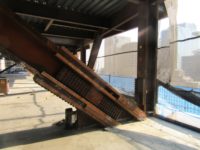U.S. Trade Representative Katherine Tai says the Biden administration will not lift tariffs on hundreds of billions of dollars in Chinese goods and that President Joe Biden would hold Beijing accountable for trade commitments made during the Trump administration.
Tai said in an Oct. 4 speech that after a months-long review, the administration has determined that China must uphold commitments it agreed to as part of a trade deal signed with the U.S. in January 2020.
[View USTR fact sheet here.]
With no thaw in sight between the two superpowers, construction estimators hoping to receive a respite from supply chain delays and market-related price increases at home will see no relief from lower costs from Chinese producers due to tariff relief.
Because of China's own supply and shipping problems, it's also debatable whether removing tariffs would make Chinese construction products' prices and availability immediately better in the U.S.
But Tai also said that the administration would reestablish an expired Trump administration exclusion process that would give some Chinese producers a reprieve by excluding them from the tariffs. The office of the U.S. Trade Representative posted a Federal Register notice Oct. 5 inviting public comments on whether to reinstate previously extended exclusions. The comment period will open Oct. 12 and close Dec. 1.
Reinstating exclusions could be a positive development for U.S. construction contractors, because it could lead to lower prices on many specific types of construction materials.
"We are worried about the administration’s intention to keep tariffs in place at a time when so many firms are struggling with surging prices and supply chain challenges," said Brian Turmail, vice president of public affairs and strategic initiatives at the Associated General Contractors of America. "The real question is whether administration officials are serious about granting waivers and whether they will grant waivers for key construction materials."
A senior Biden administration official said that the overall strategy in dealing with China would continue to involve negotiating from a position of strength in trade and other international issues.
China Purchasing Commitments Lag
China is on a pace to fall short by more than 30% of 2021 purchasing commitments of U.S.-produced goods outlined in phase one of the Trump administration's trade deal.
Purchases fell short of the 2021 commitments by more than 40% last year, said Chad P. Bown, a senior fellow at the Peterson Institute for International Economics, who tracks the purchases, in a blog post.
Chinese officials have said the COVID-19 pandemic was the reason the purchases fell short last year.
"For too long, China’s lack of adherence to global trading norms has undercut the prosperity of Americans and others around the world," Tai said in her remarks.
“In recent years, Beijing has doubled down on its state-centered economic system,” she added. “It is increasingly clear that China’s plans do not include meaningful reforms to address the concerns that have been shared by the United States and many other countries. We have a lot of work to do.”
“We will use the full range of tools we have and develop new tools as needed to defend American economic interests from harmful policies and practices,” Tai said.
Such a policy could mean the imposition of more tariffs on Chinese goods or additional countervailing and anti-dumping duties from the Commerce Dept.
“Even with the phase one agreement in place, China’s government continues to pour billions of dollars into targeted industries and continues to shape its economy to the will of the state—hurting the interests of workers here in the U.S and around the world,” Tai said.
Tariff Exclusions to Return
The revival of tariff exclusions could have an impact on U.S. construction companies. Exclusions mainly involve items that cannot be sourced or are not economically viable for contractors to source domestically.
"We will start a targeted tariff exclusion process," Tai said. "We will ensure that the existing enforcement structure optimally serves our economic interests. We will keep open the potential for additional exclusion processes, as warranted."
Tai mentioned some Chinese industries that the administration's review found to be damaging U.S.-based producers, including semiconductors and silicon photovoltaic solar panels.
Tai also pressed China on the issue of subsidies it offers to give its state-sponsored industries a competitive edge.
China Steel
But by far, the most detailed discussion in Tai's speech of imports harming domestic industry dealt with China's steel industry—a source of steel products for all North American contractors.
Tai said Chinese steel production damaged U.S. producers over the last two decades and said that market competition free of Chinese government subsidization would remain the Biden administration's policy.
“In 2000, there were more than 100 U.S. steel companies. We produced 100 million metric tons of steel annually and the industry employed 136,000 people in communities across the country,” she added.
Tai added, “Soon after, China started building its own steel plants. Its production capacity ballooned, depriving U.S. steel companies of valuable market opportunities. Low-priced Chinese steel flooded the global market, driving out businesses in the United States and around the world.”
Tai said the effort to change China's trade practices would involve talking with her counterparts in other countries and asking them to apply similar pressure on Beijing.
She also said she would discuss phase one compliance and other issues with her counterpart in China, although no talks between the two countries are currently scheduled.
This article was updated to add comments from the Associated General Contractors of America.






Post a comment to this article
Report Abusive Comment